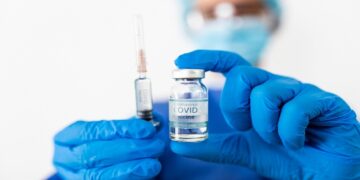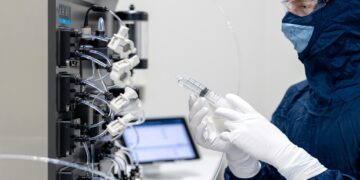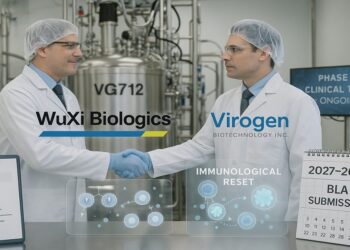Reservoirs of pharmaceuticals could be manufactured to bind specifically to infected tissue such as cancer cells for slow, concentrated delivery of drug treatments, according to new research published in ACS Macro Letters. The findings, from the University of Copenhagen and the Institut Laue-Langevin (ILL), came as a result of neutron reflectometry studies at the world’s leading neutron source in Grenoble, France. They could provide a way to reduce dosages and the frequency of injections administered to patients undergoing a wide variety of treatments, as well as minimising side effects of over-dosing.
The attachment of reservoirs of therapeutic drugs to cell membranes for slow diffusion and continuous delivery inside the cells is a major aim in drug R&D. A promising candidate for packaging and carrying concoctions of drugs is a group of self-assembled liquid crystalline particles. Composed of fatty molecules – phospholipids – and tree-like macromolecules called dendrimers, the particles form spontaneously and have the capacity to soak up and carry large quantities of drug molecules for prolonged diffusion. They are also known for their ability to bind to cellular membranes.
The first treatments using such particles are close to market through products incorporating a similar formulation called Cubosomes (cubic phase nanoparticles). Developed and commercialized by Swedish start-up Camarus Ab, its FluidCrystal® nanoparticles promise months of drug delivery from a single injection and the possibility of tuning the delivery to intervals of anything from once a day to once a month. However, a key requirement for optimal application of these formulations is a detailed understanding of how they interact with cellular membranes.
This was the focus of a collaboration between Dr Marité Cárdenas (Copenhagen) and Dr Richard Campbell and Dr Erik Watkins (ILL). In this experiment the team used neutrons to analyse the interaction of the liquid crystalline particles with a model cellular membrane whilst varying two parameters:
Gravity – to see how the interaction changed if the aggregates attacked the cell membrane from below as opposed to above
Electrostatics – to see how the balance between positive and negative charges of the aggregate and membrane affect the interaction
The team utilised a technique known as neutron reflectometry whereby beams of neutrons are skimmed off a surface. The reflectivity is measured and used to infer detailed information about the surface, including the thickness, detailed structure and composition of any layers beneath. These experiments were carried out on the FIGARO instrument at the ILL in Grenoble which offers unique reflection up vs. down modes that allowed the team to examine the top and bottom surfaces, alternating the samples on a two hourly basis during a 30 hour sampling period.
The interaction of the liquid crystalline particles with the membrane was shown to be driven by the charge on the model cell membrane. Subtle changes in the degree of negative charge on the membrane encouraged the tree-like dendrimer molecules to penetrate, allowing the rest of the molecule to bind to the surface, forming an attached reservoir. The sensitivity of the interaction to small changes in charge suggests that simple adjustments to the proportion of charged lipids and macromolecules could optimise this attachment. In the future this characteristic could also provide a mechanism to focus the treatment at targeted cells such as those infected by cancer, which are thought to be more negatively charge than healthy cells.
In terms of gravitational effects, the analysis also showed that aggregates interacted more strongly with membranes when located above the sample. Similar effects caused by differences in density and buoyancy of solutions are already exploited in some stomach treatments and the researchers would encourage future studies into how gravitational effects could be used to optimise these interactions for drug delivery.
“Cancerous cells have an imbalance that gives them a different molecular composition and overall different physical properties to normal healthy cells,” explains Dr Cardenas. “Whilst all cells are negative, cancerous cells tend to be more negatively charged than healthy ones due to a different composition of fatty molecules on their surface. This is a property that we believe could be exploited in future research into delivery mechanisms involving the attachment of lamellar liquid crystalline particles. Our next step is to introduce the drug itself into the reservoirs and make sure it can move across the membrane. This work paves the way for cell tests and clinical trials in the future exploiting our methodology.”
“Of course it’s not new that particles in formulations can sink or float, but such dramatically different specific interactions of these nanocarriers with model membranes of different orientations took us completely by surprise” said Dr Campbell. “Very small sample volumes are often used in biomedical investigations so the effects of phase separation cannot be seen. Our findings suggest that laboratory researchers may need to re-evaluate the way in which they examine the effectiveness of newly developed formulations to account for strong gravitational effects.”
Dr Watkins further commented: “This study is a perfect illustration of FIGARO’s unique capability to take data from above and below horizontal interfaces in the same experiment. Not only are neutrons uniquely sensitive to the lighter elements found in organic chemistry but the ability to take all the data at once in situ without disturbing the sample is vital. These biological samples are always subtlety changing throughout the time you are analysing them so it’s vital that you can take this data as quickly as possible.”

















